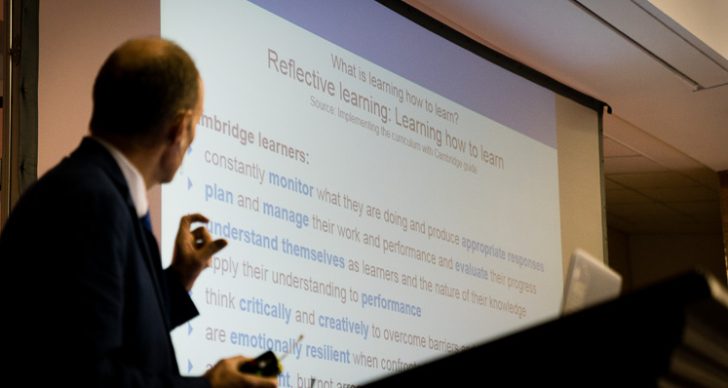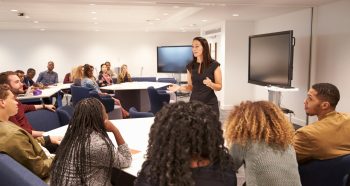I look forward to our Cambridge Schools Conferences. Bringing together principals and teachers from our global community of schools always makes for a stimulating few days of educational debate and discussion.
 The theme of our conferences in 2016 is ‘Leading learning’ and the first of these events took place in South Africa on 27-29 April. We were joined by an impressive list of keynote speakers including Professor Cheryl de la Rey, Professor Guy Claxton and C.J. Simister. They spoke on a range of topics including navigating the transition from school to university; teaching learners to teach themselves, and a character-based approach to learning. To try to sum up all that was discussed would be to do an injustice to both the speakers and the delegates. However, all the presentations and the various workshops and breakout sessions encouraged delegates to consider, ‘What will I do differently as a result of my experience at this conference?’
The theme of our conferences in 2016 is ‘Leading learning’ and the first of these events took place in South Africa on 27-29 April. We were joined by an impressive list of keynote speakers including Professor Cheryl de la Rey, Professor Guy Claxton and C.J. Simister. They spoke on a range of topics including navigating the transition from school to university; teaching learners to teach themselves, and a character-based approach to learning. To try to sum up all that was discussed would be to do an injustice to both the speakers and the delegates. However, all the presentations and the various workshops and breakout sessions encouraged delegates to consider, ‘What will I do differently as a result of my experience at this conference?’
I can’t answer the question above for each and every attendee but I can tell you a bit more about some of the key points that were raised.
Learning how to learn
Enabling students to become masters of their own destiny and manage uncertainty, was a common theme throughout the presentations and breakout sessions. Professor Cheryl de la Rey highlighted the need for undergraduates to be resilient and adaptable. How can schools support this? Learning to cope with transition is key. If schools can help students to enjoy the difficulty in the subjects they study, seeing it and seeking it as an opportunity to grow, then this will help them both at university and in the world of work.
Habits govern behaviour
In the words of Professor Cheryl de la Rey, ‘we are what we repeatedly do’. If we accept this than it becomes even more important for schools to nurture effective learning habits.
Character traits needed to succeed are universal
These character traits include; resilience, grit, commitment, self-control, curiosity, confidence and creative thinking.
Students must regulate and evaluate their learning
The term ‘metacognition’ is sometimes used to convey the idea of students bringing awareness to the processes they need to successfully complete a task. At the conference we discussed a number of approaches to teaching and learning that can nurture this capability.
 ‘Floundering intelligently’
‘Floundering intelligently’
Helping students to enjoy intellectual and practical challenges requires teachers to take a step back. It requires them to get out of the way when students are trying to work things out. Students need to learn how to enjoy the experience of ‘floundering intelligently’ (Professor Guy Claxton) through explaining approaches to complex questions rather than sticking to what is already known. In other words, understanding that curiosity, interest and confidence to succeed need to be coached rather than taught.
Each one of the points above could be blog posts in their own right. For now though, I hope I have given you a flavour of the discussion that was had in South Africa and perhaps an appetite to explore one or more of these ideas further. I know I’m keen to!
Our next Cambridge Schools Conference will be held in Cambridge in September 2016. I hope to welcome many of you there and to be part of even more lively debate around the theme of ‘Leading learning.’ Take a look at our conference highlights to find out more.





